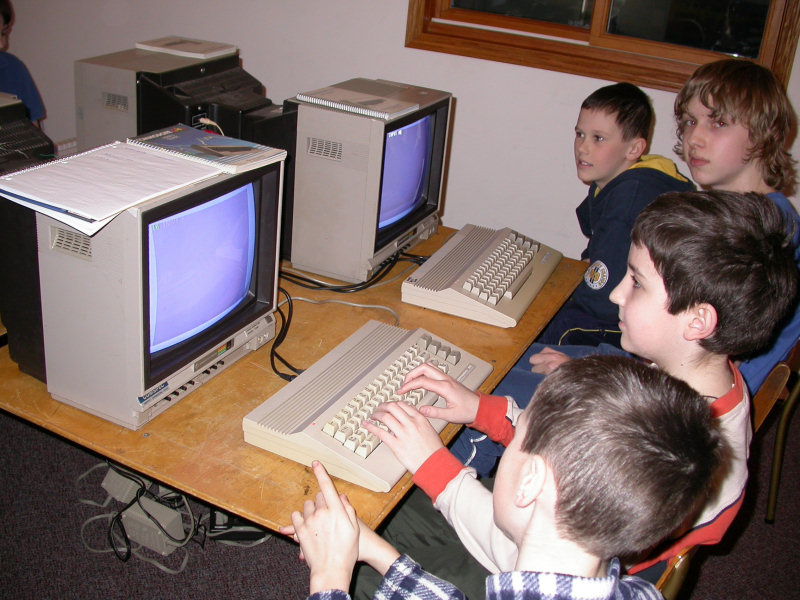Java tutorial for elementary school students
category: general [glöplog]
Actually, Preacher, let's be optimistic for once :










adok: yes, a working automatic syntax checker is always nice to have when teaching code to people who can barely read yet. are you sure you meant to say elementary school in your first post?
Adok: elementary school? you mean kids between the ages of 6-14?
Gargaj: 6-10, yes.
actually just asked my mother what grade kids learn to interpret complex sentences, she says 2nd grade so i guess they can learn to understand those code descriptions in the 3rd grade if they're really interested.
Today's youth in Portugal is expecting challenges with impatience!


Adok: out of curiousity again, how would you care the complexity of multi-digit calculations and object-oriented programming?
Gargaj: Let's start loosely. I'll bring many examples so that they get a feeling what they can do with all the commands.
*chomp* *chomp*
Now look ! The good part is coming... :D
*chomp* *chomp*
Now look ! The good part is coming... :D
*chomp* *chomp*
Adok: you didnt answer the question.
Gargaj: I'll see when I get feedback from the test kids. I'm curious how they will follow the tutorial. But I'm optimstic!
How about translating the tutorial to Hungarian? :)
How about translating the tutorial to Hungarian? :)
so you're admitting you are not aware of the complexity gap between multiplying two large numbers and object-oriented programming?
Code:
public static void main(String[] args)Adok:
And when a kid asks; "What does the part do?" what will you answer?
Or what is a "float"?
Or do they even have factorials already at that age in math?
learning math is another matter, let them begin by outputing their names and outputing their names ten times and outputing their names ten times diagonally on the screen. accumulators are welcome but not factorials.
-teacher, why did this number become negative?
-adok: <a one sided formal discussion on bits, bytes, signed representation of integers>
and introducing compile/run cycle will only bring nightmares at night to a 10-year-old. interactive modes are best for learning programming, which most basic implementations and python features.
thank god i know java well enough and have thought enough kids programming not to make such a big mistake.
-teacher, why did this number become negative?
-adok: <a one sided formal discussion on bits, bytes, signed representation of integers>
and introducing compile/run cycle will only bring nightmares at night to a 10-year-old. interactive modes are best for learning programming, which most basic implementations and python features.
thank god i know java well enough and have thought enough kids programming not to make such a big mistake.
btw, python is so good that it doesn't have integer overflow!
shouldnt education start with generic computer science first anyway? like, first telling kids what a computer is?
waffle: Anyway, running a rough "what is" simulation gave out this...
To me this seems something like 5-6 lesson at least to explain... not to mention a needed introduction to informatics (2-3 lessons?).
But maybe I'm wrong.
Quote:
public [what is??] class[what is??] Factorial[what is??]
{ <-[what is??]
public [what is??] static [what is??] void [what is??] main(String [what is??] [][what is??] args[what is??]) <-[what is??]
{
int <-[what is??] result = 1 [what is??]->;
int number= 1;
int counter;
String inputString = "";
System.out.println [what is??].[what is??].[what is??]("Enter an integer number whose factorial shall be computed!");
InputStreamReader[what is??] input = new<-[what is??] InputStreamReader(System.in);
[what is??]BufferedReader reader = new BufferedReader(input);[why??]
try [what is????????????????]
{
inputString =<-[how??]-> reader.readLine();
number =<-[how??]-> Integer.parseInt(inputString); [why?? what is??????]
} <-[what is??]
catch <-[why?](Exception[what is???] e) [what is??!!??!!!!!! D: ??]
{
System.out.print("The input is illegal. ");
System.out.print(inputString);
System.out.print(" isn't an integer number.");
return; YES PRETTY PLEASE :(
...
To me this seems something like 5-6 lesson at least to explain... not to mention a needed introduction to informatics (2-3 lessons?).
But maybe I'm wrong.
That's like 5 lessons to explain to an university student.
Perhaps this will make the kids turn to drugs or alcohol instead of becoming dull programmers in the future?
Preacher: hmm, that's true :\
Broderick: yeah, i could have keep on going with more examples but I'm more interested what would be Adok's answer to a 6-10 year old kid for the questions I pointed out. (I'm already expecting some quotes from IEEE float specification standard for the float question.) :)
This is the sort of situation where locking a thread would be appropriate. Adok's dressed up his "look at me! i'm doing a tutorial!" thread as a discussion, and then proceeded to ignore any constructive criticism. We should all his leave him to his stupid deluded exercise...
waffle: IEEE ftw! omg... :)
Anyway, quoting Einstein:
And I think that to clearly teach something one quite probably needs to have this understanding... wich is not trivial.
Anyway, quoting Einstein:
Quote:
You do not really understand something unless you can explain it to your grandmother
And I think that to clearly teach something one quite probably needs to have this understanding... wich is not trivial.
bah, give the kids a c64. built in ide+interpreter+commandlinemode+simple as fuck. =)
http://www.lemon64.com/forum/viewtopic.php?t=19470&highlight=teaching

(picture taken in 2006)
http://www.lemon64.com/forum/viewtopic.php?t=19470&highlight=teaching

(picture taken in 2006)
